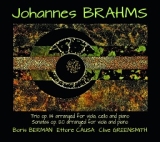Welche Merkmale verbinden Anton Stadler, Heinrich-Joseph Bärmann und Richard Mühlfeld? Alle drei waren hochkarätige Klarinettisten, die in ihrer Epoche jeweils einen Komponisten dazu anregten, Werke für ihr Instrument zu schreiben. Wolfgang Amadeus Mozart und Carl Maria von Weber waren es bei den beiden erstgenannten. Richard Mühlfeld als Orchestersolist in Meiningen, damals musikalisches Zentrum, inspirierte Brahms zu einigen späten Kammermusikwerken. Es sind die zwei Sonaten, das Quintett und in der Besetzung dazwischen ein Trio. Die beiden Sonaten op. 120 und das Trio op. 114 hat Brahms selber auch für die Bratsche statt der Klarinette gesetzt. Dieses Instrument kommt im Klang nicht nur dem Stil von Brahms entgegen, sondern kann, wenn auch anders, dunkler, intimer und damit mehr Tiefe in den polyphonen Satz. So vermisst man die Klarinette nicht, sondern hört die Werke anders mit der Viola.
Drei gestandene Solisten haben die Einspielung übernommen, wobei Clive Greensmith, viele Jahre im Tokyo String Quartet der Cellist, logischerweise nur im Trio zu hören ist. Dass Boris Berman die Musik von Brahms mit Noblesse spielt, hat er an Solowerken schon gezeigt (Rezension).
Diese Erfahrung kann er hier einbringen und in den beiden Sonaten zusammen mit Ettore Causa die Werke subtil so kredenzen, dass man ihnen zwar die späte Reife anhört, aber trotzdem nicht in Endzeitstimmung verfällt. Das wäre bei der Inspiration, die das Spiel von Richard Mühlfeld auf Brahms bestimmt hatte, sicher auch unpassend. Causa lässt die guten Seiten der Bratsche leben, wie den sonoren Klang, ohne ihre vermeintlichen Nachteile wie eine gewisse Behäbigkeit aufgrund der gegenüber der Geige größeren Bauart spüren zu lassen. Im Trio komplettiert Greensmith die Besetzung mit wunderbar vollem und trotzdem eingefügtem Spiel, so dass das Gleichgewicht der Stimmen ununterbrochen gewahrt ist. Wieder einmal legt das Label der Dégustateurs eine bemerkenswerte Kammermusikaufnahme vor, die auch in der technischen Aufbereitung keine Wünsche offen lässt. Schließlich könnte die Ansammlung dunkel temperierter Instrumente auch einen dumpfig muffigen Klang nach sich ziehen. Das wird aber zugunsten eines rundum warmen und trotzdem lebendigen Höreindrucks vermieden.
























